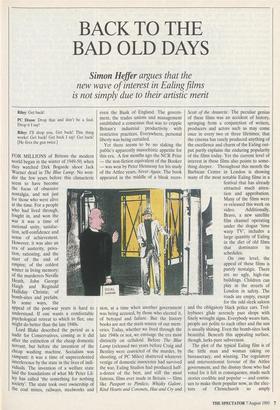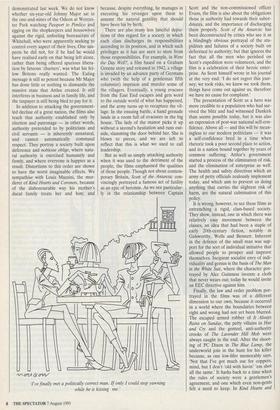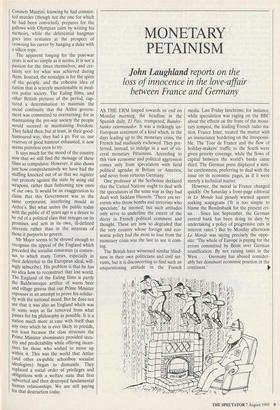BACK TO THE BAD OLD DAYS
new wave of interest in Ealing films is not simply due to their artistic merit
Riley: Get back!
PC Dixon: Drop that and don't be a fool. Drop it I say!
Riley: I'll drop you. Get back! This thing works! Get back! Get back I say! Get back! [He fires the gun twice.] Lord Blake described the period as a nadir for Conservatives, coming as it did after the extinction of the cheap domestic servant, but before the invention of the cheap washing machine. Socialism was rampant: it was a time of unprecedented Interference by the state in the lives of indi- viduals. The invention of a welfare state laid the foundations of what Mr Peter Lil- ley has called 'the something for nothing society'. The state took over ownership of the coal mines, railways, steelworks and even the Bank of England. The govern- ment, the trades unions and management established a consensus that was to cripple Britain's industrial productivity with restrictive practices. Everywhere, personal liberty was being curtailed.
Yet there seems to be no slaking the public's apparently masochistic appetite for this era. A few months ago the NCR Prize — the non-fiction equivalent of the Booker — was won by Peter Hennessy for his study of the Attlee years, Never Again. The book appeared in the middle of a bleak reces- sion, at a time when another government was being accused, by those who elected it, of betrayal and failure. But the history books are not the main source of our mem- ories. Today, whether we lived through the late 1940s or not, we envisage the era most distinctly on celluloid. Before The Blue Lamp (released two years before Craig and Bentley were convicted of the murder, by shooting, of PC Miles) shattered whatever vestige of domestic innocence had survived the war, Ealing Studios had produced half- a-dozen of the best, and still the most famous, films ever made in Britain — films like Passport to Pimlico, Whisky Galore, Kind Hearts and Coronets, Hue and Cry and Scott of the Antarctic. The peculiar genius of these films was an accident of history, springing from a conjunction of writers, producers and actors such as may come once in every two or three lifetimes; that the cinema has rarely produced anything of the excellence and charm of the Ealing out- put partly explains the enduring popularity of the films today. Yet the current level of interest in these films also points to some- thing deeper. Throughout this month the Barbican Centre in London is showing many of the most notable Ealing films in a festival that has already attracted much atten- tion and approbation. Many of the films were re-released this week on
video. Additionally, Bravo, a new satellite film channel operating under the slogan 'time warp TV', includes a large quantity of Ealing in the diet of old films that dominates its schedules.
The plot of the typical Ealing film is of the little man and woman taking on bureaucracy, and winning. The regulatory and interventionist fervour of the Attlee government, and the dismay those who had voted for it felt in consequence, made such stories credible and popular — and contin- ues to make them popular now, as the elec- tors of Christchurch so amply
demonstrated last week. We do not know whether six-year-old Johnny Major sat in the one-and-nines of the Odeon at Worces- ter Park watching Passport to Pimlico and egging on the shopkeepers and housewives against the rigid, unfeeling bureaucrats of Whitehall, who were apparently seeking to control every aspect of their lives. One sus- pects he did not, for if he had he would have realised early on that being left alone, rather than being offered spurious libera- tion by fatuous 'charters', was what his fel- low Britons really wanted. The Ealing message is still so potent because Mr Major has done little or nothing to dismantle the massive state that Attlee created. It still interferes in business and in family life, and the taxpayer is still being bled to pay for it.
In addition to attacking the government- led decline of a great nation, the films also teach that authority established only by election and patronage — in other words, authority pretended to by politicians and civil servants — is inherently unnatural, and cannot automatically command respect. They portray a society built upon deference and noblesse oblige, where natu- ral authority is exercised humanely and firmly, and where everyone is happier as a result. Distortions to this order are shown to have the worst imaginable effects. We sympathise with Louis Mazzini, the mur- derer of Kind Hearts and Coronets, because of the dishonourable way his mother's ducal family treats her and him; and
because, despite everything, he manages in executing his revenges upon them to assume the natural gentility that should have been his by birth.
There are also many less fanciful depic- tions of this regard for a society in which each class discharges its responsibilities according to its position, and in which such privileges as it has are seen to stem from those responsibilities. For example, in Went the Day Well?, a film based on a Graham Greene story and released in 1942, a village is invaded by an advance party of Germans who (with the help of a gentleman fifth columnist) imprison and murder some of the villagers. Eventually, a young evacuee from the East End escapes and gets word to the outside world of what has happened, and the army turns up to recapture the vil- lage. In the ensuing battle, a hand grenade lands in a room full of evacuees in the big house. The lady of the manor picks it up without a second's hesitation and runs out- side, slamming the door behind her. She is blown to pieces, and we are left to reflect that this is what we used to call leadership.
But as well as simply attacking authority when it was used to the detriment of the people, the films emphasised the qualities of those people. Though not about contem- porary Britain, Scott of the Antarctic con- vincingly portrayed a famous act of futility as an epic of heroism. As we see particular- ly in the relationship between Captain 'I've finally met a politically correct man. If only I could stop yawning while he is kissing me.' Scott and the non-commissioned officer Evans, the film is also about the obligations those in authority had towards their subor- dinates, and the importance of discharging them properly. Scott of the Antarctic has been deconstructed by critics who see it as a blindingly obvious portrayal of the stu- pidities and failures of a society built on deference to authority; but that ignores the fact that all the men who perished on Scott's expedition were volunteers, and the film is a celebration of their heroic enter- prise. As Scott himself wrote in his journal at the very end: 'I do not regret this jour- ney; we took risks, we knew we took them, things have come out against us, therefore we have no cause for complaint.'
The presentation of Scott as a hero was more credible to a population who had sur- vived the blitz and had witnessed Dunkirk than seems possible today, but it was also an expression of post-war national self-con- fidence. Above all — and this will be mean- ingless to our modern politicians — it was a self-confidence bred in a time when rhetoric took a poor second place to action, and in a nation bound together by years of common suffering. Attlee's government started a process of the elimination of risk, and the elimination of enterprise as well. The health and safety directives which an army of petty officials zealously implement today, and which aim to prevent us doing anything that carries the slightest risk of harm, are the natural culmination of this policy.
It is wrong, however, to see these films as entrenching a rigid, class-based society. They show, instead, one in which there was relatively easy movement between the classes, an idea that had been a staple of early 20th-century fiction, notably in Galsworthy, Wells and Bennett. Inherent in the defence of the small man was sup- port for the sort of individual initiative that allowed people to prosper and improve themselves. Incipient socialist envy of indi- viduality and genius is the basis of The Man in the White Suit, where the character por- trayed by Alec Guinness invents a cloth that never wears out; today he would invite an EEC directive against him.
Finally, the law and order problem por- trayed in the films was of a different dimension to our own, because it occurred in a world where the boundaries between right and wrong had not yet been blurred. The escaped armed robber of It Always Rains on Sunday, the petty villains in Hue and Cry and the genteel, anti-authority crooks of The Lavender Hill Mob were always caught in the end. After the shoot- ing of PC Dixon in The Blue Lamp, the underworld join in the hunt for his killer because, as one low-lifer memorably says, 'Not that I've got much use for coppers, mind, but I don't 'old with havin"em shot all the same.' It harks back to a time when the rules of society were a gentlemen's agreement, and one which even non-gents felt a need to keep. In Kind Hearts and Coronets Mazzini, knowing he had commit- ted murder (though not the one for which he had been convicted), prepares for the gallows with Olympian calm by writing his memoirs, while the deferential hangman goes into ecstasies at the prospect of crowning his career by hanging a duke with a silken rope.
The apparent longing for the post-war years is not so simple as it seems. It is not a passion for the times themselves, and cer- tainly not for what was achieved during them. Instead, the nostalgia is for the spirit of the people, and the cohesive idea of nation that is scarcely mentionable in mod- ern polite society. The Ealing films, and other British pictures of the period, cap- tured a determination to maintain the social continuity that the Attlee govern- ment was committed to overturning; for in maintaining the pre-war society the people would succeed in maintaining freedom. They failed then; but at least, in their good- humoured way, they had a go. For us, our reserves of good humour exhausted, it now seems pointless even to try.
It says much for the mood of the country now that we still find the message of these films so compulsive. However, it also shows just how comprehensively we have had the stuffing knocked out of us that we register our protests against the state by using old weapons, rather than fashioning new ones of our own. It would be an exaggeration to claim that this Government was in the same corporatist, interfering mould as Attlee's. But what unites the public today with the public of 45 years ago is a desire to be rid of a political class that reneges on its promises and acts in its own, ill-defined interests rather than in the interests of those it purports to govern.
Mr Major seems to be shrewd enough to recognise the appeal of the England which preceded the socialist consensus (a consen- sus to which many Tories, especially in their deference to the European ideal, will- ingly subscribe). His problem is that he has no idea how to reconstruct that lost world. The England of the Ealing films is partly the Baldwinesque artifice of warm beer and village greens that our Prime Minister espouses in an attempt to prove his solidar- ity with the national mood. But he does not see that it was also an England which was In some ways as far removed from what passes for his philosophy as possible. It is a nation much more at ease with itself than any over which he is ever likely to preside, not least because the class structure the Prime Minister abominates provided secu- rity and predictability while offering incen- tives for those who wished to move up within it. This was the world that Attlee (and other ex-public schoolboy socialist Ideologists) began to dismantle. They replaced a social order of privileges and obligations with a welfare state that first subverted and then destroyed fundamental human relationships. We are still paying for that destruction today.




















































 Previous page
Previous page